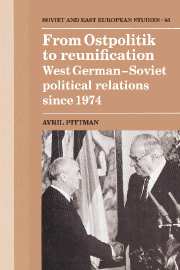Book contents
- Frontmatter
- Contents
- List of tables
- Preface
- Note on text
- Chronology
- Introduction
- 1 The Second World War and its aftermath, 1945–1974
- 2 Ethnic Germans
- 3 Berlin
- 4 The Federal Republic of Germany's relations with the German Democratic Republic
- 5 INF, Afghanistan and the post-Afghanistan period
- 6 Assessment of the Federal Republic of Germany's relations with the Soviet Union, 1974–1982
- 7 The Federal Republic of Germany's political relations with the Soviet Union after 1982
- Appendices
- Notes
- Bibliography
- Index
- Series list
6 - Assessment of the Federal Republic of Germany's relations with the Soviet Union, 1974–1982
Published online by Cambridge University Press: 12 October 2009
- Frontmatter
- Contents
- List of tables
- Preface
- Note on text
- Chronology
- Introduction
- 1 The Second World War and its aftermath, 1945–1974
- 2 Ethnic Germans
- 3 Berlin
- 4 The Federal Republic of Germany's relations with the German Democratic Republic
- 5 INF, Afghanistan and the post-Afghanistan period
- 6 Assessment of the Federal Republic of Germany's relations with the Soviet Union, 1974–1982
- 7 The Federal Republic of Germany's political relations with the Soviet Union after 1982
- Appendices
- Notes
- Bibliography
- Index
- Series list
Summary
There is a view held both in the FRG and abroad that during the Schmidt period Ostpolitik was demoted, that Ostpolitik and FRGSoviet relations began to stagnate, that the great ‘visionary’ period of Brandt was over. For example, Henri Ménudier writes in his article ‘La Politique à l'Est de Bonn’: ‘The policy towards the East has lost the priority character which it had under the Brandt governments: Mr Helmut Schmidt often gives the impression that foreign policy amounts essentially to action by the Government in the field of energy and of economics.’ But Schmidt has his defenders. A close party colleague and long-term observer of Helmut Schmidt, does not see Schmidt as having in any way undervalued the importance of Ostpolitik. A politician wants, however, to go down in history for something – Adenauer was famous for his Westpolitik, Brandt for his Ostpolitik, so Schmidt chose economics. Schmidt, it seems, never saw foreign policy as being one-sided. Furthermore, external circumstances and world interdependency and the fact that the FRG as a trading country is especially dependent on global trading conditions forced Schmidt to concentrate on economics when he came to office. The same source says, interestingly, that Schmidt saw the prominence of economics in international relations as transitional and that he did not think it would last as long as it did. And there was, of course, also the consideration that a politician would like to be re-elected and must therefore take into account that the electorate tend to ‘look at their purses rather than at foreign policy’.
That Schmidt was a man for the times is a view taken by more objective observers too.
- Type
- Chapter
- Information
- From Ostpolitik to ReunificationWest German-Soviet Political Relations since 1974, pp. 134 - 151Publisher: Cambridge University PressPrint publication year: 1992



